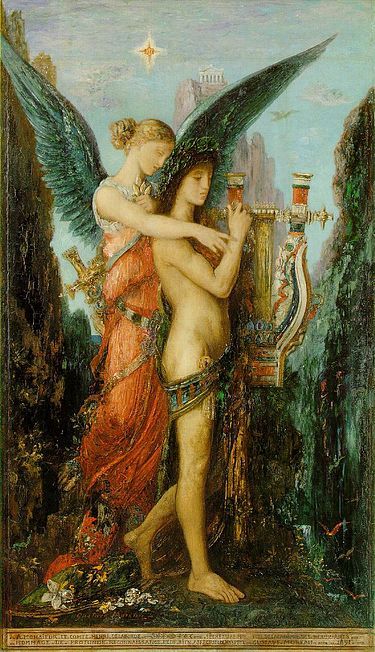There is a popular ancient story about a contest between Homer and Hesiod, imagined from the contest recounted by Hesiod in Works and Days. In it, both poets choose their best passages from their works -Hesiod chooses his section on the rising of the Pleiades constellation from Works and Days. Ultimately, the round of aristocratic judges chooses Hesiod as the superior poet over Homer because they are determining which poems will be of more value to the masses in the polis. It is determined that Hesiod’s practical advice on farming, astronomy, and wealth will be more beneficial than Homer’s tales of War and Return. Even in his day, Pausanias recounts a story of seeing Hesiod’s winning tripod on display at Mt. Helicon for travelers to see.
However, other imagined sources suggest that Hesiod must have performed his other poem, on the genesis of the gods, called Theogony. Unlike in the Works and Days, wherein Hesiod (or “he who emits the voice”) speaks directly to Perses (or the “destroyer”) and in doing so speaks to the common citizen of the polis, in the Theogony the voice is directed toward an explicitly more aristocratic audience. This is evidenced by his rebuke of power-hungry kings in the former poem, but praise of strong kingly leadership in the latter poem.
In contrast to the book of Genesis, the Theogony is a considerably different account. In Genesis the birth of the earth and living things is brought by about by the single booming voice of God. However, in Hesiod the primal being is Chaos and Gaia, and the cosmos is filled with struggle and strife between the gods. The world is without order before anything else. Take, for instance, the revolt of Cronus (Zeus’s father) against his father Uranos. He castrates his father, throwing his severed testicles into the ocean giving birth to Aphrodite who floated and arrived on the island of Cyprus.
Chaos, earth, Tartarus, and Eros are all primal things in existence. Next, black Night comes from Chaos Erebus (the “darkness” of the underworld), and out of Night and Erebus comes Aether and Daylight. Earth gives birth to the mountains and seas, sleeps with Uranos and gives birth to the Oceans and eleven other children, including Cronus. Earth gives birth to the Cyclopses. Earth also gives birth to the vengeful Furies.
Cronus and Rhea become one and give birth to the gods, including Zeus. However Cronus is afriad of being overtaken so he swallows his children, much to the sadness of Rhea. Earth feeds to Cronus a stone wrapped like a baby but it is not Zeus, and he throws them up and Zeus overtakes Cronus. Zeus makes Atlas stand at the ends of the earth with the sky on his head and the earth on his shoulders, releases Pandora, and punishes Prometheus in chains by making an eagle eat his liver each day, later released by Heracles. Zeus tames the itans in Tartarus. The poem ends as it began, with a plea to the muses, only this time to sing of the mortal humans.
For this reading I used the Daryl Hine translation.

